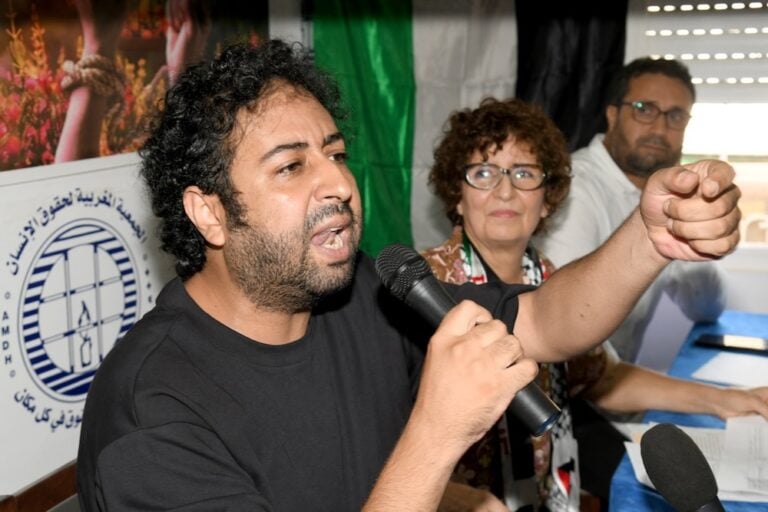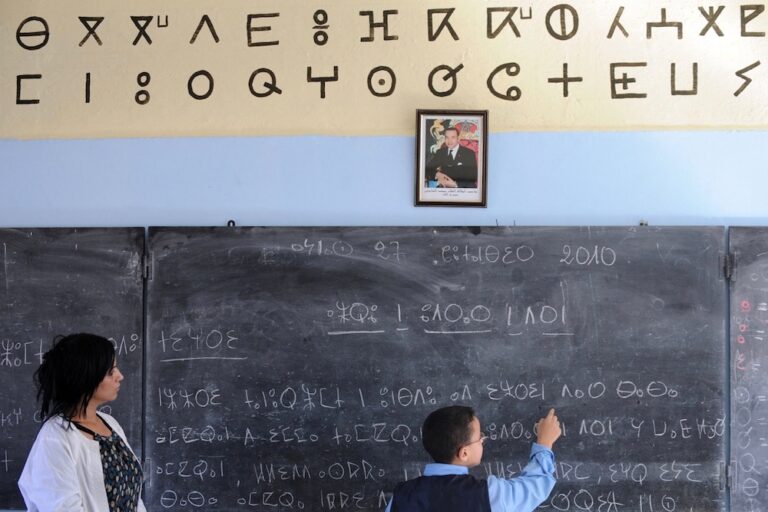(RSF/IFEX) – In a letter to King Mohammed VI, RSF emphatically protested the government’s decision to ban the three weeklies “Le Journal”, “Assahifa” and “Demain”. The newspapers are accused of “threatening the state’s stability” after having implicated the current prime minister in the attempted coup d’état against Hassan II in 1972. RSF Secretary-General Robert Ménard […]
(RSF/IFEX) – In a letter to King Mohammed VI, RSF emphatically protested the government’s decision to ban the three weeklies “Le Journal”, “Assahifa” and “Demain”. The newspapers are accused of “threatening the state’s stability” after having implicated the current prime minister in the attempted coup d’état against Hassan II in 1972. RSF Secretary-General Robert Ménard asked the king to “personally intervene so that this decision is annulled.” The organisation considers the measure to be “disquieting and absolutely condemnable”. It is contrary to all the promises made by the new monarch. The organisation asks the king to bring a definitive end to “the bad habits and authoritarian reflexes”. In an earlier letter, addressed to the king on 13 November 2000, RSF denounced the fact that certain issues become taboo as soon as they “implicate high placed state officials”. Moreover, RSF expressed its surprise that in its decision to ban newspapers, the government, led by the socialist Abderrahmane Youssoufi, used an article of the press code which the prime minister’s political party was seeking to have removed when it was in opposition.
According to information collected by RSF, on 2 December, in the evening, Minister of Culture and Communications Mohamed Achaâri announced “the permanent publication ban on [the] three weeklies” “Le Journal”, “Assahifa” and “Demain” for having “threatened the state’s stability.” On 25 November and 1 December, respectively, “Le Journal” and “Assahifa” published a letter credited to former opposition figure Mohamed Basri, which stated that the Moroccan Left was involved in the attempted coup d’état against King Hassan II in 1972, and directly implicated Youssoufi, the current prime minister and president of the Socialist Union of Popular Forces (Union socialiste des forces populaires, USFP, leftist party). Ali Lmrabet, editor of “Demain”, stated that he does not understand why his magazine was also banned. “We simply noted the disclosures of ‘Le Journal’, as many other Moroccan newspapers had, and without publishing any additional information than the others.”
According to a press release distributed to the press by Achaâri, the government’s decision “conforms with the protection of the nation’s interests and the sacred nature of its institutions”. It rests on Article 77 of the Press Code, which, according to the minister, allegedly gives the prime minister the right to ban a publication if its contents threaten the state’s foundations.
Previously, on 4 October, during a briefing on Morocco’s position concerning the Western Sahara, Interior Minister Ahmed Midaoui personally and publicly threatened Aboubakr Jamaï, editor of “Le Journal”. Making reference to an interview the weekly published with the Polisario Front president, the minister told the journalist: “If you should again publish this type of interview with a Polisario Front member, I will ban your newspaper again … You are lucky you’re not my son or I would have smashed your face in!”
Seven newspapers have been the target of publication bans by the Moroccan authorities since 1 January, including two French newspapers, “Jeune Afrique – L’intelligent” and “Le Figaro”. From 8 to 10 October, three France 3 journalists – cameraman Joseph Thual, editor Jean-Marc Pitt and video editor Michel Bernasconi – were placed under house arrest in Errachidia (in Morocco’s east) because they had filmed military installations. Finally, on 4 November, the Ministry of Culture and Communications withdrew Claude Juvénal’s accreditation. Juvénal is the Agence France Presse’s Rabat bureau chief. The Moroccan authorities accused the journalist of “straying from the professional code of ethics by taking initiatives which were hostile to Morocco and its institutions”.
The incriminating articles are available on RSF’s website: www.rsf.fr


